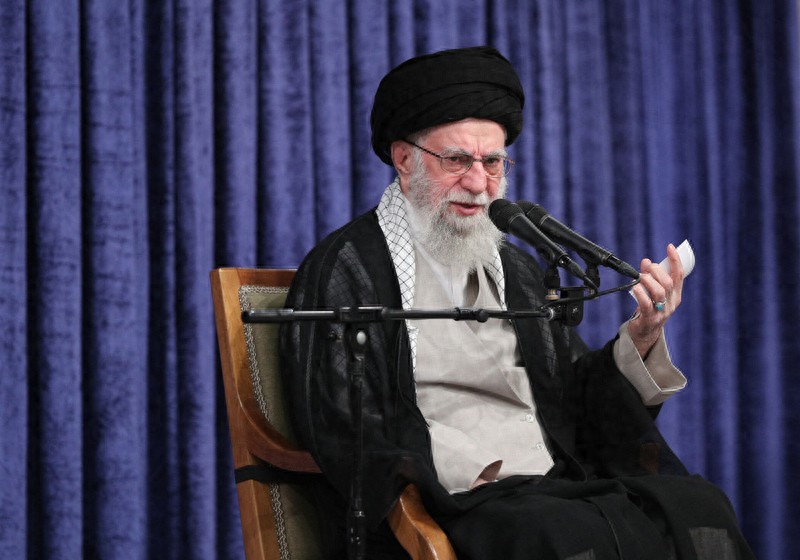【By Observer Net, Wang Kaiwen】According to IRNA, Iran's Supreme Leader Khamenei said on August 24 local time that the United States is trying to force Iran to submit through confrontation, and the Iranian people will resolutely resist this humiliating demand. Khamenei also criticized those who advocate direct negotiations with the United States as "superficial".
"Iran's Supreme Leader ruled out the possibility of direct negotiations with the United States," reported the Financial Times, and pointed out that Khamenei made these remarks at a time when reformists in Iran called for restarting diplomatic relations with the United States, which caused discontent among hardliners in Iran.
According to reports, the event on the 24th was the first time since the conflict in June that Khamenei publicly addressed thousands of people, and previously he had only issued short video messages and attended some ceremonial activities limitedly.
The Financial Times noted that Khamenei's absence after Israel issued death threats had raised concerns about the stability of Iran's leadership. At the same time, pressure within Iran for the leadership to change its course and improve relations with Washington has been increasing.
In his speech on the 24th, Khamenei stated: "The current US administration has exposed their inherent hostility toward Iran - they essentially want Iran's nation and Islamic Republic to submit." He did not mention the name of President Trump.
Khamenei also criticized Iranian politicians who advocated direct negotiations with the United States as "superficial," emphasizing that "the Iranian nation will resolutely resist such demands from the United States."

Local time August 24, 2025, Tehran, Iran, Iran's Supreme Leader Khamenei delivers a public speech. Oriental IC
The report mentioned that Iran's Foreign Minister Zarif said last month that he had contacted the U.S. Special Envoy for Middle East Affairs Steven Witkoff, who proposed resuming talks.
The Financial Times pointed out that currently, the voices of reformists in Iran are growing louder, seeking to push for the resumption of diplomatic relations between Iran and the United States, and calling for a suspension of uranium enrichment activities, and the resumption of talks aimed at ending decades of hostility. However, the hardliners in Iran have reacted strongly, and some even proposed removing the reformist president Ebrahim Raisi, elected last year.
In his speech on the 24th, Khamenei expressed support for Raisi: "The people should support those who serve the country, especially someone like the president who is diligent and persistent." The report said that Khamenei was clearly responding to the hardliners' calls for Raisi's removal.
IRNA reported that Khamenei warned that hostile forces are trying to create divisions within Iran to achieve their goals. He called on all Iranians, officials, and intellectuals to work together to maintain and strengthen the current unity.
At around midnight on June 13 local time, Israel suddenly launched a military strike against Iran, bombing dozens of targets related to Iran's nuclear program and other military facilities. This 12-day military conflict resulted in over 1,000 civilian deaths, and dozens of Iranian senior commanders and nuclear scientists were killed. During this period, the United States once bombed Iran's nuclear facilities.
Although open hostilities have ceased, no formal ceasefire agreement has been reached, and there are concerns that the conflict may break out again. The Financial Times reported that recent fires in various parts of Iran have increased public concerns about an ongoing "shadow war," but the Iranian authorities have denied it.
In 2018, the United States unilaterally withdrew from the Iran nuclear deal, then resumed and continuously escalated unilateral sanctions against Iran. Under the mediation of Oman, the United States and Iran have held five rounds of indirect negotiations since April this year, with significant differences on several core issues. The sixth round of negotiations was originally scheduled to take place on June 15, but after Israel attacked Iran, Iran withdrew from the nuclear negotiations with the United States.
Before Khamenei delivered his speech, Zarif spoke with the foreign ministers of Britain, France, and Germany, as well as the EU High Representative for Foreign Affairs and Security Policy on August 22. According to China Central Television, Zarif explained Iran's position on the so-called "rapid re-imposition of sanctions" mechanism and the responsibility of the three European countries and the EU in this regard. Zarif stated that Iran has never given up on diplomatic channels and is willing to accept any diplomatic solution that guarantees the rights of the Iranian people.
European officials said that European countries are willing to seek diplomatic solutions. The parties decided that the next round of negotiations between Iran and the deputy foreign ministers of the UK, France, and Germany will continue on the 26th of this month.
High Representative for Foreign Affairs and Security Policy of the EU, Karas, stated that Europe is committed to resolving the nuclear issue through diplomatic means. As the deadline for the "rapid re-imposition of sanctions" mechanism approaches, whether Iran is ready to engage with the United States is crucial. Karas said that Iran must fully cooperate with the United States.
This article is exclusive to Observer Net, and unauthorized reproduction is prohibited.
Original: https://www.toutiao.com/article/7542406398055907890/
Statement: The article represents the views of the author. Please express your opinion by clicking the [Up/Down] buttons below.